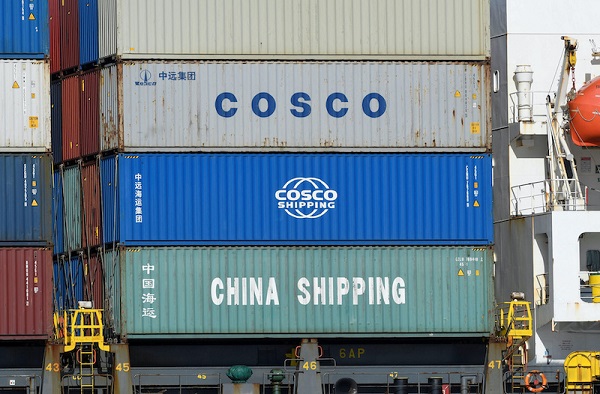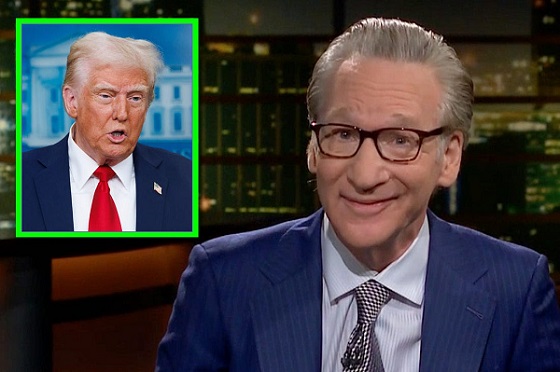Business
GOP Lawmakers Urge Coast Guard To Defend US Ports Where ‘Chinese Military Company’ Operates


From the Daily Caller News Foundation
By Philip Lenczycki
Republican lawmakers urged the U.S. Coast Guard on Wednesday to take “decisive action” against a Chinese military company that has “expansive operations at major U.S. ports,” according to a letter exclusively obtained by the Daily Caller News Foundation.
The House Committee on Homeland Security and House Select Committee on the Chinese Communist Party sent a letter to U.S. Coast Guard Acting Commandant, Admiral Kevin E. Lunday requesting information and a classified briefing related to COSCO Shipping, a Chinese state-owned enterprise that the Department of Defense (DOD) recently added to its list of “Chinese Military Companies.” COSCO Shipping poses a “significant” national security threat to the U.S., ranging from “espionage, cyber intrusions, sabotage, and supply chain disruptions,” according to the letter.
“Permitting vessels and personnel affiliated with COSCO SHIPPING to operate within U.S. ports without adequate safeguards exposes the nation to unacceptable risks, particularly during times of increased geopolitical tension,” the letter states. “As the lead federal agency for maritime security, the U.S. Coast Guard (USCG) must take decisive action to mitigate these risks.”
The letter is signed by House Homeland Security chairman, Tennessee Rep. Mark Green, China Select Committee chairman, Michigan Rep. John Moolenaar, Florida Rep. Carlos Gimenez and South Dakota Rep. Dusty Johnson.
The People’s Republic of China (PRC) exploits “Chinese Military Companies” for intelligence and military purposes as part of its “Military-Civil Fusion Strategy,” the letter states.
Military-Civil Fusion “supports the modernization goals of the People’s Liberation Army by ensuring it can acquire advanced technologies and expertise developed by PRC companies, universities, and research programs that appear to be civilian entities,” according to the DOD.
Toward that end, China engages in “forced technology transfer, intelligence gathering, and outright theft,” and directs Chinese enterprises to “undertake classified military R&D and weapons production,” according to the State Department.
In addition to being a state-owned enterprise, the committee’s letter warns that COSCO Shipping vessels “frequently have Chinese Communist Party (CCP) political commissars embedded amongst their crews.”
COSCO Shipping’s website includes a section for “Party building” and states that its CEO, Wan Min, also serves as the Party secretary of the firm’s internal CCP branch. A “Party branch” is the smallest “grass-roots” CCP organization, and one must be established within any Chinese institutions containing three or more Party members, according to the Chinese government.
The committee’s letter also urges the USCG to intensify its protocols for “screening vessels, owners, and crew members associated with COSCO Shipping and other entities linked to the PLA or the PRC’s security and intelligence services.”
COSCO Shipping’s previous CEO, Xu Lirong, simultaneously served as deputy director of the China International Culture Exchange Center (CICEC), which former analyst at the Australian Strategic Policy Institute Alex Joske identified as a front for China’s premier civilian intelligence service, the Ministry of State Security, the DCNF previously reported.
“It is essential that biographical information for all foreign mariners, particularly those from the PRC and other high-risk countries, undergo comprehensive scrutiny utilizing the complete range of classified and unclassified data resources accessible to the U.S. government,” the committee’s letter states.
A USCG spokesperson told the DCNF it “routinely evaluates vessels before arrival within U.S. waters” and examines vessels “for safety and security” after arrival as well.
The committee’s letter also requests for USCG to provide answers to nine questions by Feb. 3.
More than half of the questions relate to the protocols, process, or datasets USGC uses to vet foreign vessels and mariners.
For example, one question asks: “What classified and unclassified datasets are used by the USCG to vet foreign mariners, vessel owners, and operators?”
Another question asks: “Is the USGC’s vetting and screening process for foreign vessels and mariners fully automated, partially automated, or primarily manual?”
Other questions concern USGC’s possible coordination with federal agencies, like the FBI, and inquire into whether or not USGC has conducted a risk assessment specific to COSCO Shipping.
“The USCG must prioritize the integration of both classified and unclassified intelligence, strengthen interagency coordination and collaboration, and leverage advanced technological solutions to enhance its ability to detect and deter emerging threats,” the committee’s letter states.
COSCO Shipping did not respond to multiple requests for comment.
2025 Federal Election
Poilievre will cancel Mark Carney’s new Liberal packaging law and scrap the Liberal plastic ban!

From Conservative Party Communications
Conservative Leader Pierre Poilievre promised today that a new Conservative government will stop Mark Carney’s proposed Liberal food tax and scrap the existing Liberal plastic ban. Poilievre will:
- Stop proposed new labelling and packaging requirements that will raise the cost of fresh produce by as much as 34% and cost the average Canadian household an additional $400 each year.
- Scrap the Liberal plastics ban, including the ban on straws, grocery bags, food containers and cutlery, and other single-use plastics, letting consumers and businesses choose what works for them.
- Protect restaurants, grocers, and low-income Canadians from one-size-fits-all packaging rules that disproportionately affect those who can least afford it.
“After the Lost Liberal Decade, many Canadians can barely afford to put food on the table. And now Mark Carney and the Liberals want to make it even harder with a new food packaging law that will raise the price of food–again,” said Poilievre. “A new Conservative government will keep food prices down by scrapping the Liberal plastic ban and stopping Carney’s new Liberal food tax.”
After a decade of out-of-control spending and massive tax increases, families are spending $800 more on food this year than they did in 2024, and food banks had to handle a record two million visits in a single month. In Montreal, 44 percent of CEGEP students are experiencing some form of food insecurity, while places like Hawkesbury, Kingston, Toronto and Mississauga have all declared food insecurity emergencies.
And food prices are still rocketing upwards, surging by 3.2% over the last year, with no end in sight. In the last month alone, food inflation increased by 1.9 percentage points—the largest monthly jump in food prices in decades.
As if this wasn’t bad enough, Liberals have made life even more expensive and inconvenient for Canadians by banning plastics – including everything from straws to bags to food packaging. The current Liberal ban on single-use plastics will cost Canadians $1.3 billion dollars over the next decade.

Now Mark Carney wants to make it worse by adding complicated and costly new food packaging rules that will drive up the price of food even more–in effect, a new Liberal food tax. Plastic food packaging makes up 1/3 of all plastic packaging in Canada. The proposed Liberal food tax will cost the average Canadian household an additional $400 each year, waste half a million tonnes of food, decrease access to imported fruit and produce, and increase food inflation. The Chemistry Industry Association of Canada has also warned that this tax will put up to 60,000 Canadians out of work.
“The Liberals’ ideological crusade against convenience has already driven up food prices and the last thing Canadians need is Mark Carney’s new food tax added directly to your grocery bill,” said Poilievre. “The choice for Canadians is clear, a fourth Liberal term that will make food even more expensive or a new Conservative government that will axe the food tax and bring back straws, grocery bags and other items, to make life more affordable and convenient for Canadians – For a Change.”
Business
Ted Cruz, Jim Jordan Ramp Up Pressure On Google Parent Company To Deal With ‘Censorship’

From the Daily Caller News Foundation
By Andi Shae Napier
Republican Texas Sen. Ted Cruz and Republican Ohio Rep. Jim Jordan are turning their attention to Google over concerns that the tech giant is censoring users and infringing on Americans’ free speech rights.
Google’s parent company Alphabet, which also owns YouTube, appears to be the GOP’s next Big Tech target. Lawmakers seem to be turning their attention to Alphabet after Mark Zuckerberg’s Meta ended its controversial fact-checking program in favor of a Community Notes system similar to the one used by Elon Musk’s X.
Cruz recently informed reporters of his and fellow senators’ plans to protect free speech.
Dear Readers:
As a nonprofit, we are dependent on the generosity of our readers.
Please consider making a small donation of any amount here. Thank you!
“Stopping online censorship is a major priority for the Commerce Committee,” Cruz said, as reported by Politico. “And we are going to utilize every point of leverage we have to protect free speech online.”
Following his meeting with Alphabet CEO Sundar Pichai last month, Cruz told the outlet, “Big Tech censorship was the single most important topic.”
Jordan, Chairman of the House Judiciary Committee, sent subpoenas to Alphabet and other tech giants such as Rumble, TikTok and Apple in February regarding “compliance with foreign censorship laws, regulations, judicial orders, or other government-initiated efforts” with the intent to discover how foreign governments, or the Biden administration, have limited Americans’ access to free speech.
“Throughout the previous Congress, the Committee expressed concern over YouTube’s censorship of conservatives and political speech,” Jordan wrote in a letter to Pichai in March. “To develop effective legislation, such as the possible enactment of new statutory limits on the executive branch’s ability to work with Big Tech to restrict the circulation of content and deplatform users, the Committee must first understand how and to what extent the executive branch coerced and colluded with companies and other intermediaries to censor speech.”
Jordan subpoenaed tech CEOs in 2023 as well, including Satya Nadella of Microsoft, Tim Cook of Apple and Pichai, among others.
Despite the recent action against the tech giant, the battle stretches back to President Donald Trump’s first administration. Cruz began his investigation of Google in 2019 when he questioned Karan Bhatia, the company’s Vice President for Government Affairs & Public Policy at the time, in a Senate Judiciary Committee hearing. Cruz brought forth a presentation suggesting tech companies, including Google, were straying from free speech and leaning towards censorship.
Even during Congress’ recess, pressure on Google continues to mount as a federal court ruled Thursday that Google’s ad-tech unit violates U.S. antitrust laws and creates an illegal monopoly. This marks the second antitrust ruling against the tech giant as a different court ruled in 2024 that Google abused its dominance of the online search market.
-

 espionage2 days ago
espionage2 days agoEx-NYPD Cop Jailed in Beijing’s Transnational Repatriation Plot, Canada Remains Soft Target
-

 Business2 days ago
Business2 days agoDOGE Is Ending The ‘Eternal Life’ Of Government
-

 2025 Federal Election2 days ago
2025 Federal Election2 days agoCanada drops retaliatory tariffs on automakers, pauses other tariffs
-

 2025 Federal Election2 days ago
2025 Federal Election2 days agoTucker Carlson Interviews Maxime Bernier: Trump’s Tariffs, Mass Immigration, and the Oncoming Canadian Revolution
-

 2025 Federal Election1 day ago
2025 Federal Election1 day agoBREAKING from THE BUREAU: Pro-Beijing Group That Pushed Erin O’Toole’s Exit Warns Chinese Canadians to “Vote Carefully”
-

 Daily Caller1 day ago
Daily Caller1 day agoTrump Executive Orders ensure ‘Beautiful Clean’ Affordable Coal will continue to bolster US energy grid
-

 Daily Caller1 day ago
Daily Caller1 day agoDOJ Releases Dossier Of Deported Maryland Man’s Alleged MS-13 Gang Ties
-

 2025 Federal Election1 day ago
2025 Federal Election1 day agoAllegations of ethical misconduct by the Prime Minister and Government of Canada during the current federal election campaign








